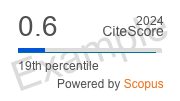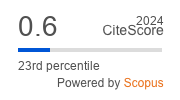ALLELIC IMBALANCE IN THE TP53 GENE IN PATIENTS WITH DIFFUSE LARGE B-CELL LYMPHOMA CARRIERS RS78378222
https://doi.org/10.29001/2073-8552-2017-32-2-18-22
Abstract
It is known that rs78378222 disrupt TP53 gene expression and reduce the level of apoptosis in cells under the influence of genotoxic factors. Cases of rs78378222 detection in a tumor tissue have been described in DLBCL patients previously. Objective: to study the frequency of rs78378222 TP53 gene in tumor tissue of patients with diffuse large cell lymphoma (DLBCL) in Novosibirsk. Material for the study were the DNA isolated by phenol-chloroform extraction using guanidine from paraffin blocks of tumor tissue biopsies from 92 patients with DLBCL. Rs78378222 genotyping was performed by PCR RFLP analysis. The presence of the rare allele C of rs78378222 was performed direct sequencing of Sanger. rs78378222 in DLBCL tumor tissue was detected in 9.8% of cases. In same of the samples the marker was detected in the homozygous state, indicating the loss of heterozygosity in the TP53 gene in tumor tissue diffuse DLBCL. Rare allele C rs78378222 are not met in the homozygous state in healthy tissues. Thus, the phenomenon of loss of heterozygosity in the TP53 gene in tumor tissue of patients carriers rs78378222 with DLBCL is a classic example of the “two-hit” mechanism of carcinogenesis.
About the Authors
E. N. VoropaevaРоссия
T. I. Pospelova
Россия
M. I. Voevoda
Россия
I. O. Marinkin
Россия
V. N. Maksimov
Россия
T. A. Ageeva
Россия
O. V. Berezina
Россия
M. A. Kolesnikova
Россия
References
1. Копнин Б.П., Копнин П.Б., Хромова Н.В. и др. Многоликий р53: разнообразие форм, функций, опухольсупрессирующих и онкогенных активностей // Клиническая онкогематология. – 2008. – Т. 1, № 1. – С. 2–9.
2. Поспелова Т.И., Воевода М.И., Воропаева Е.Н. и др. Значение конституциональных полиморфизмов гена Р53 у больных неходжкинскими злокачественными лимфомами // Бюллетень Сибирской медицины. – 2008. – Т.7, № 3. – С. 56.
3. Поспелова Т.И., Лосева М.И., Ковынев И.Б. и др. Основы опухолевой прогрессии гемобластозов // Сибирский научный медицинский журнал. – 2004. – Т. 24, № 2. – С. 71–73.
4. Avery-Kiejda K.A., Zhang X.D., Adams L.J. et al. Small molecular weight variants of p53 are expressed in human melanoma cells and are induced by the DNA-damaging agent cisplatin // Clin. Cancer Res. – 2008. – Vol. 14. – P. 1659–1668.
5. Diederichs S., Bartsch L., Berkmann J.C. et al. The dark matter of the cancer genome: aberrations in regulatory elements, untranslated regions, splice sites, non-coding RNA and synonymous mutations // EMBO Mol. Med. – 2016. – Vol. 8, No. 5. – P. 442–57.
6. Enciso-Mora V., Hosking F.J., Di Stefano A.L. A Low penetrance susceptibility to glioma is caused by the TP53 variant rs78378222 // Br. J. Cancer. – 2013. – Vol. 108. – P. 2178–2185.
7. Gudkov A.V., Komarova E.A. The role of p53 in determining sensitivity to radiotherapy // Nat Rev Cancer. – 2003. – Vol. 3, No. 2. – P. 117–129.
8. International Cancer Genome Consortium, Hudson T.J., Anderson W. et al. International network of cancer genome projects // Nature. – 2010. – Vol. 464. – P. 993–998.
9. Li Y., Gordon M.W., Xu-Monette Z.Y. et al. Single nucleotide variation in the TP53 39 untranslated region in diffuse large B-cell lymphoma treated with rituximab-CHOP: a report from the International DLBCL Rituximab-CHOP Consortium Program // Blood. – 2013. – Vol. 121, No. 22. – P. 4529–40.
10. Liang Y., Lin S.Y., Brunicardi F.C. DNA damage response pathways in tumor suppression and cancer treatment // World J. Surg. – 2009. – Vol. 33. – P. 661–666.
11. Macedo G.S., Araujo Vieira I., Brandalize A.P. et al. Rare germline variant (rs78378222) in the TP53 3’UTR: Evidence for a new mechanism of cancer predisposition in Li-Fraumeni syndrome // Cancer Genetics. – 2016. – Vol. 209. – P. 97–106.
12. Stacey S.N., Sulem P., Jonasdottir A. et al. A germline variant in the TP53 polyadenylation signal confers cancer susceptibility // Nat. Genet. – 2011. – Vol. 43, No. 11. – P. 1098–1103.
13. Ventura A., Kirsch D.G., McLaughlin M.E. Restoration of p53 function leads to tumour regression in vivo // Nature. – 2007. – Vol. 445, No. 7128. – P. 661–665.
14. Wang Y., Wu X.S., He J. et al. A novel TP53 variant (rs78378222 A > C) in the polyadenylation signal is associated with increased cancersusceptibility: Evidence from a meta-analysis // Oncotarget. – 2016. – doi: 10.18632/oncotarget.9056. [Epub ahead of print].
15. Wang Z., Rajaraman P., Melin B.S. et al. Further Confirmation of Germline Glioma Risk Variant rs78378222 in TP53 and Its Implication in Tumor Tissues via Integrative Analysis of TCGA Data // Hum Mutat. – 2015. – Vol. 36, No. 7. – P. 684–688.
16. Zhou L., Qipeng Y., Ming Y. A functional germline variant in the P53 polyadenylation signal and risk of esophageal squamous cell carcinoma // Gene. – 2012. – Vol. 506. – P. 295–297.
Review
For citations:
Voropaeva E.N., Pospelova T.I., Voevoda M.I., Marinkin I.O., Maksimov V.N., Ageeva T.A., Berezina O.V., Kolesnikova M.A. ALLELIC IMBALANCE IN THE TP53 GENE IN PATIENTS WITH DIFFUSE LARGE B-CELL LYMPHOMA CARRIERS RS78378222. Siberian Journal of Clinical and Experimental Medicine. 2017;32(2):18-22. (In Russ.) https://doi.org/10.29001/2073-8552-2017-32-2-18-22
JATS XML




.png)





























